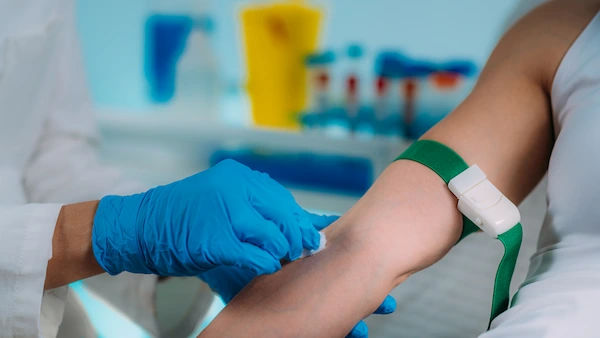Normal Electrolyte Levels Explained
Understand what normal electrolyte levels mean for your body's essential functions. Learn about key electrolytes and their ideal ranges.

Written by Dr. Mohammed Kamran
Reviewed by Dr. Rohinipriyanka Pondugula MBBS
Last updated on 30th Jul, 2025
.webp?tr=q-80,f-webp,w-350,dpr-2,c-at_max 700w)
Normal Electrolyte Levels Explained
Introduction
Electrolytes are essential minerals in your body that help regulate important functions like nerve activity, muscle contractions, hydration, and pH balance. Maintaining normal electrolyte levels is crucial for overall wellbeing. If these levels become too high or too low, it can lead to health problems.
In this article, we’ll explain what electrolytes are, their normal ranges, why they matter, and how you can keep them balanced.
What Are Electrolytes?
Electrolytes are minerals that carry an electric charge when dissolved in body fluids like blood and urine. The key electrolytes include:
- Sodium (Na+) – Helps control fluid balance and nerve/muscle function.
- Potassium (K+) – Essential for heart rhythm and muscle contractions.
- Calcium (Ca2+) – Supports bones, teeth, and muscle function.
- Magnesium (Mg2+) – Aids muscle and nerve function, energy production.
- Chloride (Cl) – Works with sodium to maintain fluid balance.
- Bicarbonate (HCO3) – Helps regulate blood pH (acidbase balance).
Normal Electrolyte Levels in the Body
Here’s a simple breakdown of the normal ranges for each electrolyte in blood tests:
These ranges may vary slightly depending on the lab, so always check with your doctor for personalized results.
Get Your Symptoms Assessed
Why Are Electrolyte Levels Important?
Electrolytes play a vital role in:
- Nerve and Muscle Function – They help transmit signals for movement and reflexes.
- Hydration – They balance fluids inside and outside cells.
- Heart Health – Potassium and sodium are critical for a steady heartbeat.
- Bone Strength – Calcium and magnesium support bone density.
When electrolyte levels are too high (hyper) or too low (hypo), it can cause problems like:
- Fatigue, weakness, or muscle cramps
- Irregular heartbeat (arrhythmia)
- Confusion, dizziness, or seizures
- Nausea, vomiting, or diarrhea
What Causes Electrolyte Imbalances?
Several factors can disrupt electrolyte balance, including:
- Dehydration – Not drinking enough water or losing fluids through sweating, vomiting, or diarrhea.
- Kidney Problems – The kidneys help regulate electrolytes; dysfunction can cause imbalances.
- Medications – Diuretics, blood pressure drugs, or chemotherapy can affect levels.
- Poor Diet – Low intake of potassium, magnesium, or calcium-rich foods.
- Chronic Conditions – Diabetes, heart disease, or hormonal disorders (like thyroid issues).
Consult Top Nutritionists
How to Maintain Healthy Electrolyte Levels?
Ways to maintain healthy electrolyte levels:
1. Stay Hydrated
- Drink enough water daily (about 2–3 liters, depending on activity level).
- After intense exercise or sweating, consider electrolytic-rich drinks (like coconut water or oral rehydration solutions).
2. Eat a Balanced Diet
Include these electrolytic-rich foods:
- Sodium – Table salt (in moderation), pickles, olives.
- Potassium – Bananas, spinach, sweet potatoes, avocados.
- Calcium – Dairy (milk, yogurt), leafy greens, almonds.
- Magnesium – Nuts, seeds, whole grains, dark chocolate.
3. Monitor Medications
- If you take diuretics, blood pressure meds, or other drugs affecting electrolytes, regular blood tests can help track levels.
4. Exercise Smartly
- Replenish lost electrolytes after intense workouts with sports drinks (if needed).
- Avoid excessive sweating without proper hydration.
5. Seek Medical Advice for Symptoms
- If you experience persistent fatigue, muscle cramps, irregular heartbeat, or confusion, consult a doctor. A simple electrolyte panel blood test can check your levels.
When to See a Doctor?
If you suspect an electrolyte imbalance due to:
- Severe dehydration (dark urine, extreme thirst).
- Persistent muscle spasms or weakness.
- Irregular heartbeats or fainting spells.
Your doctor may recommend:
- Blood tests to check electrolyte levels.
- IV fluids in severe cases.
- Dietary adjustments or supplements if deficiencies are found.
Final Thoughts
Electrolytes are tiny but mighty minerals that keep your body functioning smoothly. By staying hydrated, eating a balanced diet, and monitoring symptoms, you can help maintain healthy levels. If you’re unsure about your electrolyte balance, a simple blood test can provide clarity.
Need help? You can book a consultation with a doctor or schedule an electrolyte test through Apollo 24|7 for quick and reliable results. Stay informed, stay healthy!
Consult Top Nutritionists
Consult Top Nutritionists

Mr Aritra Khan
Dietician
16 Years • Clinical Dietitian Critical Care Nutritionist Diabetes Educator. e Academic Counselor & Examiner( Msc DFSM, IGNOU) PDFFM&CCN,Doctorate(PH&CN), FCN,PGDCN ,PGCDE, CCN, CRN, CCCN, CLHF, CPN
Kolkata
Samaritan Clinic, Kolkata
(250+ Patients)
Ms. Lakshmi Tejasvi
Clinical Nutritionist
14 Years • M.Sc - Clinical Nutrition
Hyderabad
Vibgyor Nutri, Hyderabad
Dt. Ila Sharma
Clinical Nutritionist
18 Years • Master in food & Nutrition
Gurugram
VIPUL GREENS - SOCIETY CLINIC, Gurugram

Dr. Ramalinga Reddy
General Physician
5 Years • MBBS MD General medicine
Bengaluru
PRESTIGE SHANTHINIKETAN - SOCIETY CLINIC, Bengaluru
Dr Sumanth R
General Physician
2 Years • MBBS
Bengaluru
PRESTIGE SHANTHINIKETAN - SOCIETY CLINIC, Bengaluru
Consult Top Nutritionists

Mr Aritra Khan
Dietician
16 Years • Clinical Dietitian Critical Care Nutritionist Diabetes Educator. e Academic Counselor & Examiner( Msc DFSM, IGNOU) PDFFM&CCN,Doctorate(PH&CN), FCN,PGDCN ,PGCDE, CCN, CRN, CCCN, CLHF, CPN
Kolkata
Samaritan Clinic, Kolkata
(250+ Patients)
Ms. Lakshmi Tejasvi
Clinical Nutritionist
14 Years • M.Sc - Clinical Nutrition
Hyderabad
Vibgyor Nutri, Hyderabad
Dt. Ila Sharma
Clinical Nutritionist
18 Years • Master in food & Nutrition
Gurugram
VIPUL GREENS - SOCIETY CLINIC, Gurugram

Dr. Ramalinga Reddy
General Physician
5 Years • MBBS MD General medicine
Bengaluru
PRESTIGE SHANTHINIKETAN - SOCIETY CLINIC, Bengaluru
Dr Sumanth R
General Physician
2 Years • MBBS
Bengaluru
PRESTIGE SHANTHINIKETAN - SOCIETY CLINIC, Bengaluru



.webp)

